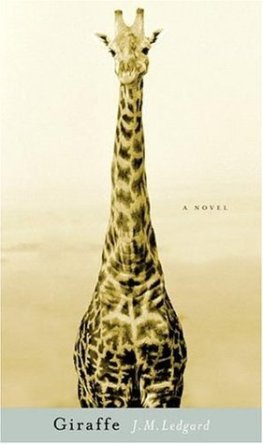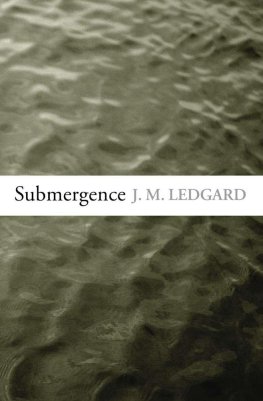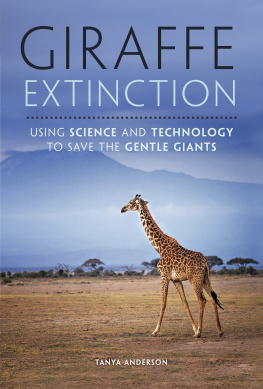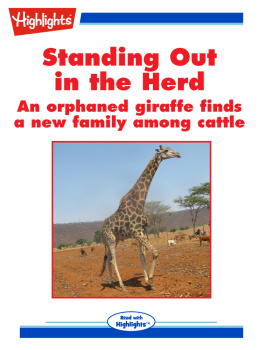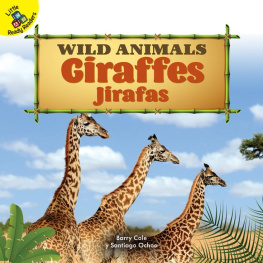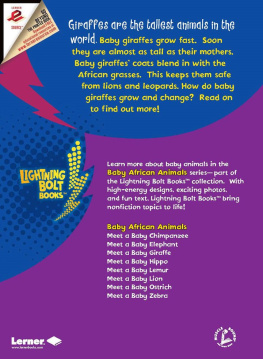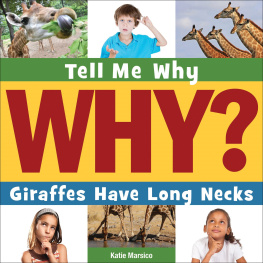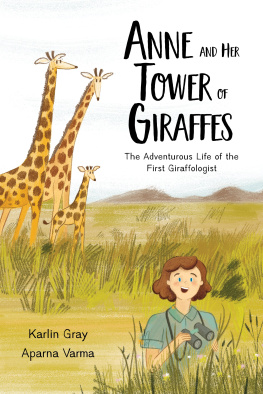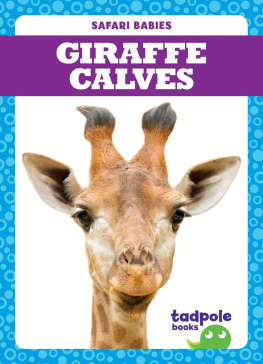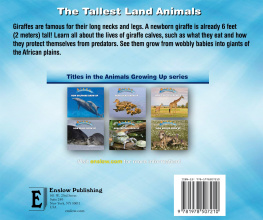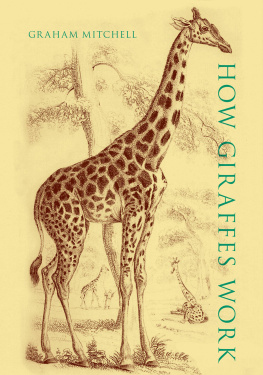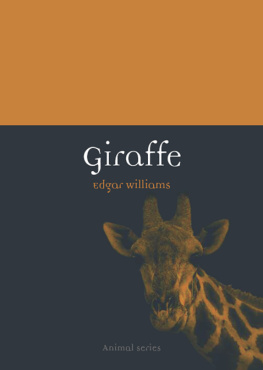J. M. Ledgard was born on the Shetland Islands, Scotland, in 1968, and educated in England, Scotland, and America. He has been a foreign correspondent for The Economist since 1995 and is a contributor to The Atlantic. He divides his time between Europe and Africa.
In Memoriam
Alexandr Hackenschmied
19072004
Democritus, if he were still on earth, would deride a throng gazing with open mouth at a beast half camel, half leopard.
HORACE
ST. HUBERTS DAY
NOVEMBER 3, 1971
I KICK NOW IN the darkness and see a coming light, molten, veined through the membrane and fluids of the sac, which contains me. I am squeezed toward the light. Let it be said: I enter this world without volition.
My hooves come first, then my nose, then the whole of my head. I hang halfway out. I swing. I fall. I am found, I am found at this moment, and my coming into being is a head-over-hooves tumble from weightlessness to weight and from the drowning, which has no memory, to what has breath and is yet to be.
It is white-hot out here, thin; it sears. The falling takes the longest time. The first thing I see is my own form, my hooves impossibly far away, slicked with fluid, and my mazed hide, bloodied, flickering in the haze, burning, as though I am not passing from my mother to the ground, but from the constellation Camelopardalis into the Earths atmosphere.
The ground comes to me from upside down, a flopping view, flopping with my neck. I see a blue-and-cream swallow flying close and away up onto an ash-colored grassland, where forms of other animals and trees are pegged to the soil, not falling into the azure sky below. I hit the ground headfirst, with a thud. Dust rises about me and settles. I lie quite still, among gathering ants, taking the measure of the air and of gravity. I blink back the light of the sun. I feel my lungs swelling. My heart beats on its own account, for me alone. Such a volume of blood passes through my chambers, rises, and rises again, and sinks, circulating within me, creating a buoyancy that will keep me upright for all my living days.
My mother nudges me with a hoof and now with her nose. She licks membrane from my hide in a thoroughgoing manner. I do not stir. I remain motionless in the dust until the shadow of a cloud settles above me and comforts me; I am without understanding and remember nothing of constellations but only that it was darker and thicker where I came from. I slowly lift my neck. I kick out my legs. I try to stand. Several times I climb up and several times I fall back down, so there is a question about my form: How can I be upraised on such slender legs? Now I make it. I quiver here, beside my mother. Instincts and customs of the herd enter me, unbidden. I see the order of my captivity, my searching up, gravity pulling me down, and the resultant journeys across. The sounds of this world, which came at first to me as single and unbroken, break now into songs of the earth, of termites, vultures, armored beasts wallowing, and of my own breath. I run a little, from one cloud shadow to another and back again to my mother, as on stilts.
I know I will grow fast now, as grass after rain, and that the form of my growing shall be upward. This is as it should be, as it was ordained since my earliest embryonic stage, for I am a giraffe and everything about my body is for stretching up. I am a giraffe, I am about that space a little above the blade, and my bodily intent is to be elevated above all other living things, in defiance of gravity.
I HAVE GROWN INTO the finest young cow in my herd. I move confidently down cuts in the hills of red stone that bound the ash-colored grassland and emerge at other places, among various striped zebras. Most of the giraffes born with me have died of sickness or been killed by predators in their infancy. No lioness has come for me. I am alive under these acacia trees. I browse on my hind legs now, in the upper branches, where bull giraffes most often have claim. I am aware: I see the green metal flying toward me in this white light. I try to move out of its path; I know it is a tranquilizer dart. It deeply pierces my rump. A band of Czechoslovakians resolves out of the thorn trees. I bleat once at them the first audible sound I have ever made. I run in one direction; my herd runs in another. How I run from these Czechoslovakians! My legs extend, my mane catches in the wind. Faster and faster I go; I reach a full gallop, swifter than any horse. It is no use. The Czechoslovakians keep pace behind me in tan-colored trucks that bounce over dry streambeds and rip through insect trails.
Chemicals rise within me. I slow. My eyes open into hemispheres of panic and then dull from the etorphine. My head falls back, my muzzle rises, my ears flatten. I cannot go on. I have no breath; all the air in my trachea is dead. The trucks circle. Around and around they go, revving, braking, drawing close. I move toward a watering hole, thinking to drink. A Czechoslovakian in a safari hat jumps out of one of the trucks. He makes a hand signal. Two African men rush forward and steal in under me. They draw a short rope around the upper part of my forelegs and my chest. A few Czechoslovakians come close now and sling a noose about my neck. They all of them pull smoothly at the ropes. I reel. I collapse. I feel these men around me, upon me, impossibly above me. I try to kick out at them, to catch them with a hoof, but there is nothing in me, there is no control. The Czechoslovakian in the safari hat kneels down beside me. I feel his hands around my throat, searching for my jugular vein. He finds it. He takes a long needle and drives it through my hide into the vein and injects me with the antidote diprenorphine. I am blindfolded. My ears are packed with cotton wool and muslin. I feel myself hauled upright and walked to one of the trucks.
I am tied to hot planking and driven now on the back of this truck in a silence and blindness that is my own, that is not of the womb, but is instead immediate, fearful, buffeting, hot with the midday sun. I am unbound and unmasked at a makeshift camp under the red hills. The Czechoslovakians stop and stare up at me. They examine me and give me the name Snhurka, or Snow White, because of the unusual whiteness of my underbelly and legs, which they say reminds them of the snows of Kilimanjaro. From this point on, for as long as I live, the voices of men will call after me, Snhurka! They will call my name, and I will recognize the sound, as I have long ago learned to distinguish the sound of one insect from another.
There are many other captured giraffes in the camp. We are not divided between our subspecies. I am fenced in with Rothschild and Masai giraffes as well as other reticulated giraffes. We are not so separate. Our height and gaits are similar, our horns are the same iron color. Only the patterns of our hides are distinct: the Rothschild blotched, the Masai drawn in fig leaves of Adam, the reticulated, as mine, in a fine lattice of white. We might mingle and breed, although this sometimes produces blank offspring, free of any marking.
There is one young Rothschild bull placed in a pen by himself. He rushes about in fits. He snorts. He draws back his neck and shoulders in a bow and bares his yellow teeth like a wild ass. He keeps himself drawn tight until this moment, when the Czechoslovakians shrug, open the fencing, and set him free. I watch him buck and skid out past the tents in the camp onto the grassland, disappearing quickly out of sight.
Look at his neck, one of the Czechoslovakians says. See how it rolls forward and back with each stride, like the mast of a sailing ship in a heavy sea.

